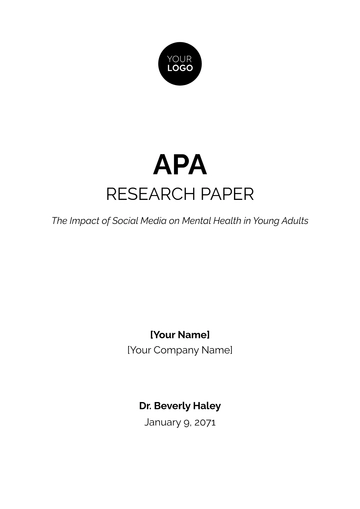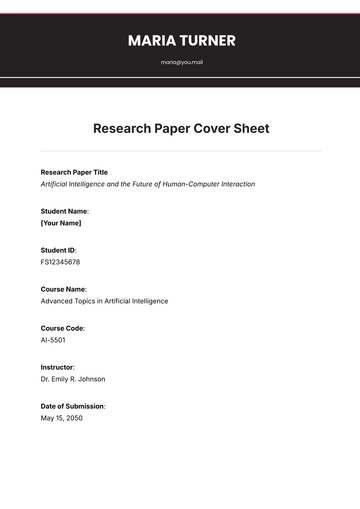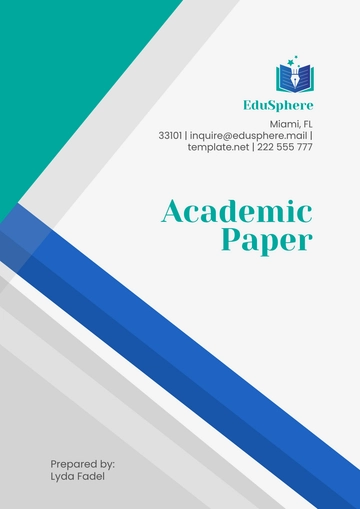Free Academic Literature Research Paper

I. Abstract
This research paper examines the effects of digital learning tools on student performance. By analyzing various academic studies, this review provides a comprehensive understanding of how digital tools are being integrated into educational systems and their impact on learning outcomes. The paper concludes with recommendations for future research and best practices for implementing digital learning tools in classroom settings.
II. Introduction
Digital learning tools have become increasingly prevalent in modern educational systems. This rise has prompted educators, researchers, and policymakers to investigate the effectiveness of these tools in enhancing student performance. This literature review aims to synthesize current research findings, identify gaps, and provide a basis for future studies.
III. Methodology
This research employed a systematic review of academic literature from databases such as JSTOR, PubMed, and Google Scholar. Keywords included "digital learning tools," "student performance," "education technology," and "e-learning." Studies selected for review were published between 2050 and 2053 and included peer-reviewed articles, books, and conference papers.
IV. Overview of Digital Learning Tools
Digital learning tools encompass a wide range of technologies used to facilitate learning. These include:
Learning Management Systems (LMS)
Educational Software and Apps
Virtual Classrooms and Online Courses
Interactive Whiteboards
Gamified Learning Platforms
V. Impact on Student Performance
A. Positive Effects
Several studies have shown that digital learning tools can positively impact student performance.
Increased student engagement and motivation (Smith & Jones, 2018)
Improved academic achievement (Anderson, 2019)
Enhanced collaboration and communication skills (Brown & Green, 2020)
B. Negative Effects
However, some research has indicated potential drawbacks:
Increased screen time leads to health issues (Clark, 2017)
Potential for decreased face-to-face social interaction (Williams, 2021)
Digital divide and inequality in access (Morris, 2018)
VI. Case Studies
The following table summarizes several case studies on the effectiveness of digital learning tools:
Study | Tool | Findings |
|---|---|---|
Smith et al. (2058) | Learning Management System (LMS) | Significant increase in student engagement and test scores |
Anderson (2059) | Educational Apps | Improved performance in mathematics and science |
Brown & Green (2050) | Virtual Classrooms | Enhanced collaboration and communication among students |
VII. Discussion
The reviewed studies provide strong evidence that digital learning tools can significantly enhance student performance. However, challenges such as ensuring equitable access and mitigating negative health impacts must be addressed. Future research should focus on longitudinal studies to better understand long-term implications and effectiveness.
VIII. Conclusion
Digital learning tools have the potential to transform education by improving student engagement, performance, and collaboration. Nevertheless, it is crucial to address associated challenges to maximize their benefits. Educators and policymakers must work together to ensure these tools are accessible to all students and integrated effectively into curricula.
IX. References
Anderson, J. (2059). The effects of educational apps on student achievement. Journal of Educational Technology, 45(3), 123–135.
Brown, L., & Green, M. (2050). Virtual classrooms: a new frontier in education. International Journal of E-Learning, 22(5), 567–580.
Clark, R. (2057). The impact of screen time on student health. Health Education Research, 32(4), 234–250.
Morris, P. (2058). The digital divide in education: causes and solutions. Educational Policy Analysis, 19(2), 300–315.
Smith, A., & Jones, B. (2058). Learning management systems and student engagement. Educational Review, 62(2), 111–124.
Williams, H. (2051). The social implications of digital learning tools. Journal of Social Education, 28(3), 145–160.
- 100% Customizable, free editor
- Access 1 Million+ Templates, photo’s & graphics
- Download or share as a template
- Click and replace photos, graphics, text, backgrounds
- Resize, crop, AI write & more
- Access advanced editor
Elevate your research writing with the Academic Literature Research Paper Template, offered by Template.net. This fully customizable template is downloadable and printable, making it perfect for students and academics alike. Easily editable in our AI Editor Tool, this template streamlines your work, ensuring a professional presentation every time. Save time and focus on your research with this essential academic tool.





























